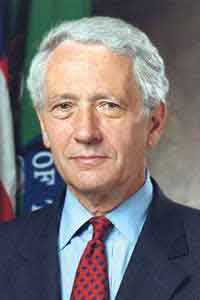Dam played key role in disrupting terrorist financing
By Peter SchulerNews Office
 Kenneth Dam |
In a distinguished 45-year career, Kenneth Dam has balanced legal scholarship with service in the public and private sectors and has recently played a key role in the war on terror.
Dam, the Max Pam Professor of American and Foreign Law, recently returned to the Law School after two years as Deputy Secretary of the Treasury. In December 2002, President Bush appointed him Acting Treasury Secretary after the resignation of Secretary Paul O’Neill. Dam, who recently taught a course on art law, has been a faculty member at the Law School since 1960 and was Provost of the University from 1980 to 1982.
Dam has devoted much of his academic work and numerous books and other writing to applying law and economics principles to contemporary public policy issues, particularly in the international arena.
He previously served in Washington as Deputy Secretary of State from 1982 to 1985. From 1971 to 1973, Dam served as assistant director for national security and international policy in the Office of Management and Budget, which culminated in his appointment in 1973 as executive director of the Council on Economic Policy, the White House office responsible for coordinating U.S. domestic and international economic policy.
Dam began his most recent tour of duty in Washington at the start of the Bush administration in 2001, joining his friend and colleague O’Neill in the Treasury Department. Dam and O’Neill had worked together at the Office of Management and Budget during the Nixon Administration. From 1987 to 2002, Dam served on the Board of Directors of the Alcoa Corporation, where O’Neill had been Chairman and C.E.O.
After the terrorist attacks on the World Trade Center towers on Sept. 11, 2001, Dam was asked to develop and lead programs at the Treasury Department to disrupt terrorist financing and to implement the provisions of the USA Patriot Act concerning financial institutions.
“The Act requires financial institutions to terminate accounts maintained for foreign shell banks,” Dam explained. “All banks have also been required to institute anti-money laundering programs. The goal is to deprive terrorists of one of the raw ingredients in terrorism: money for arms, explosives, plane tickets and even the day-to-day sustenance of operatives.” Dam said that when there is a conflict between preventing terrorist attacks and the prosecution of criminal cases, the policy is that preventing terrorist attacks comes first.
Dam focused much of his efforts on illicit charities that have funneled money to terrorist organizations. “These so-called charities are particularly deplorable,” Dam said. “The challenge has been to create a comprehensive strategy to clean up illicit charities while still providing vehicles for legitimate charitable works. We are now working with countries around the world to help raise the standards of oversight and accountability for charities.”
Dam also chaired a federal interagency committee that set strategic priorities for the financial front of the war on terror. In the year following 9/11, the U.S. government had already frozen more than $112 million of identified terrorist assets. “We’ve succeeded in cutting the flow of terrorist money through funding pipelines, and our law enforcement efforts have also proven fruitful.”
Dam is optimistic that the United States is winning its war on terror. “I’m proud to have been able to participate in this war. We are now disrupting the ability of terrorists to plan, operate and execute attacks, and we are forcing them to resort to methods, such as bulk cash smuggling, that expose them to a greater risk of detection and capture. We have made significant progress, but there is much more to be done.”
![[Chronicle]](/images/sidebar_header_oct06.gif)